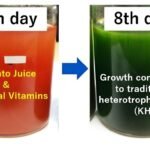by The University of Manchester
An ambitious plan to sequence the genomes of all known species of euglenoids over the next decade has been launched today. The network of scientists behind the initiative believe it has the potential to drive breakthroughs ranging from new biofuels and sustainable foods to cancer medicines.

The Euglena International Network (EIN), founded in 2020, is a global consortium of hundreds of scientists around the world with the collective goal of supporting euglenoid science through collaborative and integrative omics between academics and industry. Professor Rob Field, director of the Manchester Institute of Biotechnology, sits on the steering committee for the EIN and he and his lab will be part of the cross-discplinary network of scientists working to understand and discover the capabilities of the 800-strong species and strains of Euglena.
The EIN has today published a position paper in Biology Open, outlining the case for a concerted effort to generate high quality reference genomes for the nearly 1,000 known species of euglenoids.
Euglenoids are part of the protist group, home to eukaryotic organisms that do not fit into animal, plant, or fungi groups. These diverse single-celled organisms are found in an exceptionally wide range of ecosystems around the world.
Multiple euglenoid species have translational applications, showing great promise in the production of biofuels, nutraceuticals, bioremediation, cancer treatments, and even as robotics design simulators. Their enormous potential has been largely untapped due to a lack of high-quality reference genomes.
Euglenoid genomes present a particular sequencing challenge because they are an example of secondary endosymbiosis – housing mitochondria, chloroplasts, and remnants of genetic material from organisms they enveloped to acquire these organelles.
As a result, fewer than 20 species have been explored at any level for translational potential through genomics. The EIN believes the time is right to address this.
Through generating high quality reference genomes for the known species of euglenoids, the EIN will work to:
- Understand the basic biology of euglenoids;
- Understand the evolution of euglenoids;
- Maximise euglenoid applications in ecological and environmental management;
- And explore, translate, and commercialise euglenoid products.
Data collected by the EIN will be openly available to the scientific community through the European Nucleotide Archive (ENA). Once in the ENA, annotated genomes can be imported into resources such as Ensembl Protists and presented in a uniform and FAIR way to research communities.
Stay Always Informed
Join our communities to instantly receive the most important news, reports, and analysis from the aquaculture industry.
Professor Field’s interest in this area goes back to 2015 when he and his lab were the first to describe the unexpected capabilities of Euglena gracilis, including using it for creating a range of sugars and other natural products. They’ve since gone on to describe novel cyclic peptide antifungal agents produced by Euglena which could prove useful for the pharmaceutical industry. Together with the rest of the network they hope to work together to better understand the more than 800 species of Euglena and exploit their potential.
“At the Manchester Institute of Biotechnology, we are constantly on the look-out for new bioactive molecules with pharmaceutical potential, along with green ways to make them, rapidly and at scale. While many current drugs are derived from plant and bacterial natural products, the algal world has remained largely unexplored. Pulling together an international network with diverse skills and interests gives us the very best chance of opening up algal biotechnology as a means of discovering new drugs and agrochemicals. There are exciting times ahead and we look forward to hosting a major EIN community event in Manchester in 2025″, said Professor Rob Field, Director of MIB.
Dr. ThankGod Echezona Ebenezer, Founding President of EIN and a Bioinformatician at the European Bioinformatics Institute (EMBL-EBI), UK, said: “The Euglena International Network will play a crucial role in helping to assemble specialists on euglenoids to increase our understanding of euglenoids biology and its translational applications. This could be useful to furthering our understanding of the evolution of parasitism, social gaming, developing jet fuels, or supporting human space exploration”.
The Euglena International Network is an affiliated network to the Earth BioGenome Project and the International Society of Protistologists.
Reference (open access)
ThankGod Echezona Ebenezer, Ross S. Low, Ellis Charles O’Neill, Ishuo Huang, Antonio DeSimone, Scott C. Farrow, Robert A. Field, Michael L. Ginger, Sergio Adrián Guerrero, Michael Hammond, Vladimír Hampl, Geoff Horst, Takahiro Ishikawa, Anna Karnkowska, Eric W. Linton, Peter Myler, Masami Nakazawa, Pierre Cardol, Rosina Sánchez-Thomas, Barry J. Saville, Mahfuzur R. Shah, Alastair G. B. Simpson, Aakash Sur, Kengo Suzuki, Kevin M. Tyler, Paul V. Zimba, Neil Hall, Mark C. Field; Euglena International Network (EIN): Driving euglenoid biotechnology for the benefit of a challenged world. Biol Open 1 November 2022; 11 (11): bio059561. doi: https://doi.org/10.1242/bio.059561
Editor at the digital magazine AquaHoy. He holds a degree in Aquaculture Biology from the National University of Santa (UNS) and a Master’s degree in Science and Innovation Management from the Polytechnic University of Valencia, with postgraduate diplomas in Business Innovation and Innovation Management. He possesses extensive experience in the aquaculture and fisheries sector, having led the Fisheries Innovation Unit of the National Program for Innovation in Fisheries and Aquaculture (PNIPA). He has served as a senior consultant in technology watch, an innovation project formulator and advisor, and a lecturer at UNS. He is a member of the Peruvian College of Biologists and was recognized by the World Aquaculture Society (WAS) in 2016 for his contribution to aquaculture.







